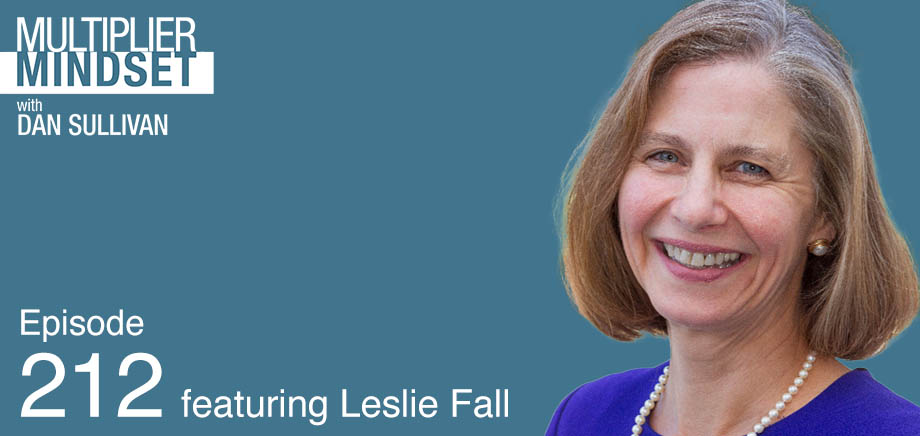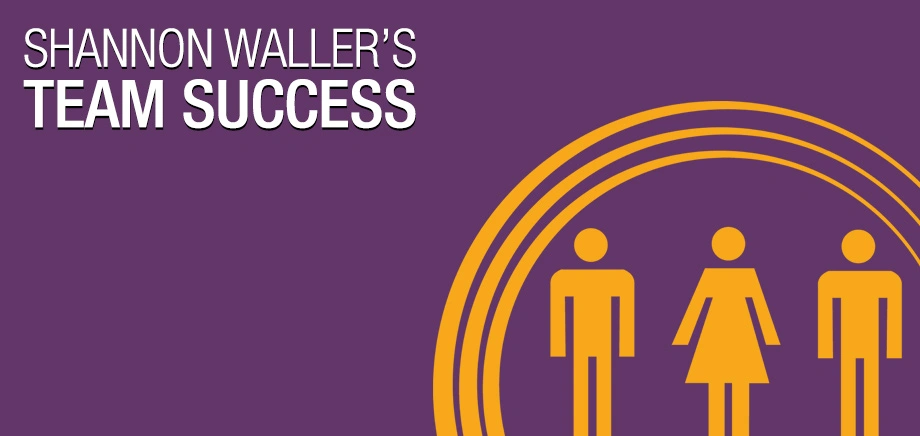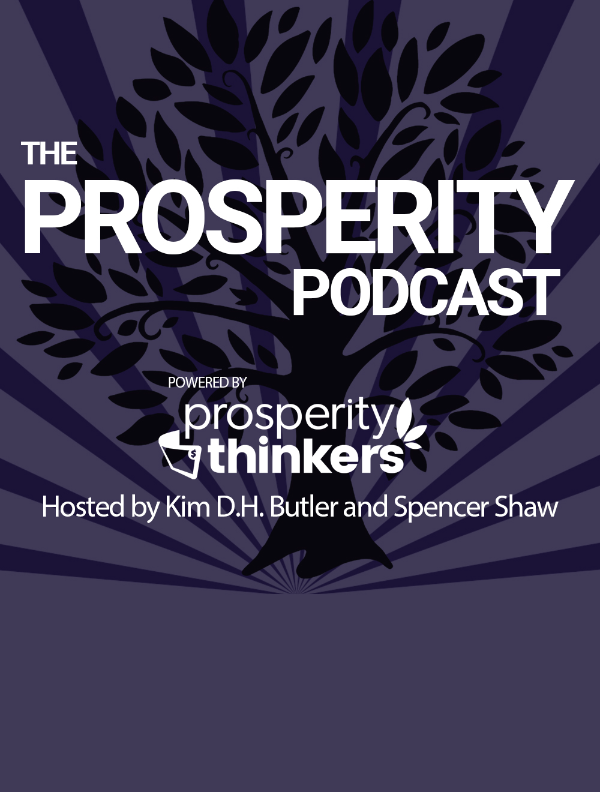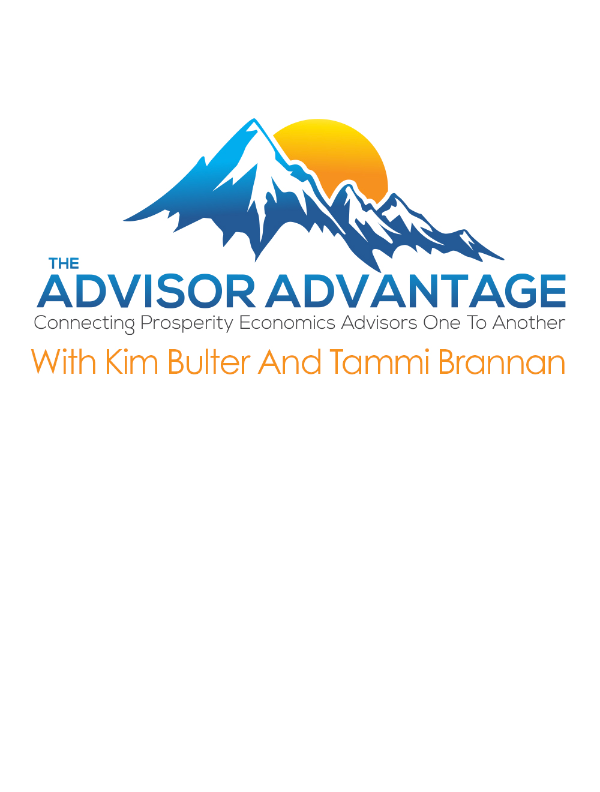Rewind: Business Growth Means Finding The Right People, with Leslie Fall
March 13, 2024
Hosted By
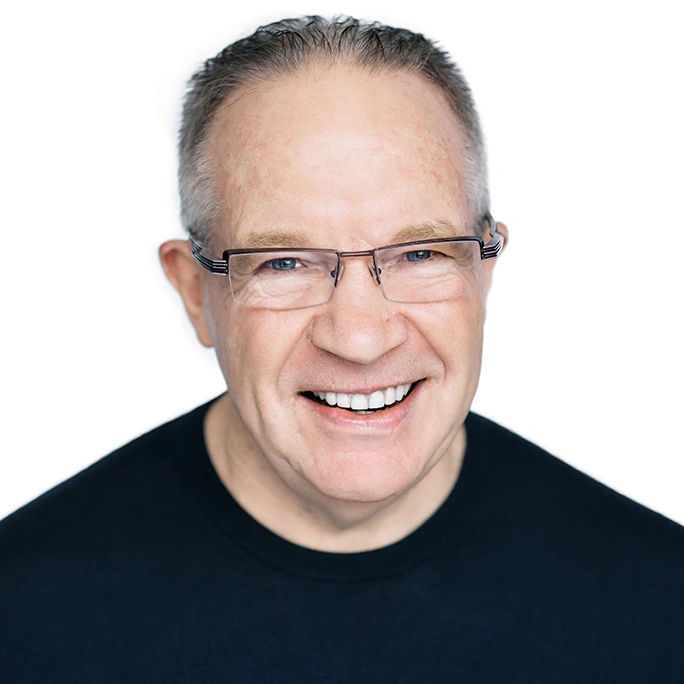 Dan Sullivan
Dan Sullivan
In one of our favorite episodes, entrepreneur Leslie Fall shares how a team member who helped get her to a certain level of success was no longer helping the company grow. Leslie explains how, by employing the concept of “multiplication by subtraction,” she overcame the problem to great benefit, plus other gains she’s made since taking advantage of business coaching through Strategic Coach.
Here’s some of what you’ll learn in this episode:
- What Leslie gets out of being in a community of like-minded entrepreneurs.
- The changes a colleague has noticed in Leslie since she joined Strategic Coach.
- How Leslie introduces Strategic Coach thinking tools to her colleagues.
- How her team now gets four months’ worth of work done in under a week.
Show Notes:
Sometimes, you have to let go of what your job typically is in order to let team members grow.
For reasons of fit or reasons of competence, a team member can hold you back.
It can take a fresh perspective to notice inefficiencies in your process.
It’s exciting to see where people will go once their time has been freed up.
When people have the time and mental energy, they’ll be more alert, curious, responsive, and resourceful.
Team members who are freed up have time to think about other opportunities for revenue.
You're probably only relying on your team 50% of what you could be.
The minute you think of a new idea, think about who can help you with it.
Resources:
Who Not How by Dan Sullivan and Dr. Benjamin Hardy
Multiplication By Subtraction by Shannon Waller
Free Days™ – The Entrepreneur’s Guide To Time Management
Episode Transcript
Dan Sullivan: Hi, this is Dan Sullivan. I'd like to welcome you to the Multiplier Mindset Podcast.
Today's Free Zone transformation success story is one that I know really, really clearly because I've coached thousands of entrepreneurs, but there are certain individuals, they just get my attention right away. And Leslie Fall, who comes from New Hampshire, and she lives right in beautiful mountain country in the state of New Hampshire. Leslie's very, very interesting because I sensed in the first workshop that she might be experiencing a lot of obstacles in what we were doing. But within the first three months, first six months, she just went right to the heart of the matter. And that is the fundamental concept of Who Not How that we have in Strategic Coach. She had so much holding her back, you know, that she could tell right off the bat. And I guess this is, you know, why she bet on Strategic Coach that it was going to help her. But the big thing is she needed one incredible "Who" to actually transform how she operated and to totally transform the company. OK, and that was her Chief Financial Officer. And the moment that Chief Financial Officer came in, first of all, that Leslie was, you know, using up enormous amount of energy doing something, one, that she didn't like doing. And the other thing was, she didn't get any reward for it. There was no energy. It wasn't great being around her when she was stressed out by what she was doing. But the moment she got freed up, she became, you know, in the eyes, as she tells the story, that her team just saw an incredible difference in her.
Leslie Fall: I'm Leslie Fall. I'm a pediatrician by training, but I'm now the full-time executive director of Aquifer Incorporated, which is a non-profit organization that produces and delivers online medical education to most of the United States medical students, as well as osteopathic medical schools and a number of Canadian schools as well. It's interesting, I think there's a balance between what we've learned to do as physicians and what is a successful entrepreneur. So sometimes I find myself really drawing off of what I've learned to do. You know, as a doctor, identify problems, figure out what the right question is, identify a solution, execute on it, pull back when that's not working, re-figure out what the next step is, move ahead with that. Teamwork, particularly making sure that you've got the right team, you know what their Unique Abilities are, you're leveraging them. I mean, the last thing you want me to do is manage an IV pump at a patient's bedside. You know, the nurses, that's their Unique Ability and they really dread me going in there and doing that. Same thing goes for my medical students and residents as I'm training them. I have to get better and better at understanding what their emerging Unique Abilities are, where they want to grow, and sometimes letting go of what my job typically is to let them get a chance to do that. So I ultimately don't have a lot of problems delegating because that's what I did for a living and now still do just with my entrepreneurial team, not my medical team.
I mean, I think there's a couple of aspects of medicine that are still getting used to the idea that a product or a business, especially in medical education, especially in academic medicine in which my whole career has been based, sometimes is a bit of a challenge. I think there's definitely this, we call it town/gown difference as well. And I think it's been really, really fun to watch me bring some of the tools from Coach over the last two years back to my colleagues, adapt it to the world that they're used to, but then really show them how they can be utilized as new tools to solve problems that we're trying to work on together. I think the other part that's been really interesting too is, about six months ago, I had one of my colleagues say to me how much I've changed and grown since joining the Program and how much more confident I've become and how much more clear I've been able to be about my vision and our direction in the organization and really how that's going to help them grow too. And I was pretty surprised to hear that, but they really said no, it was really, really quite clear, especially after about the first year, how much I had grown.
You know, in the Program, as I look around, a lot of people nod their head and think like, why haven't I figured this out already? But it began for me right before Dan started talking a lot about Who Not How, with discussions about "multiplication by subtraction." Really dealing with that tough issue when you have somebody on your team who has contributed in the past or isn't yet contributing at the level you need them to. And you really realize for reasons of fit, reasons of competence that it's just holding you back. And so taking the courage and diving in and making a major change is sort of how it started for me. So, I realized I needed to make that major change in my organization. It was a little scary because this is somebody who had gotten me from really where we had been three years ago when I took the position full time to where we were today. But that was hard to realize that person wasn't going to help me at the next step. It was actually starting to hold us back.
And so right around that time was when Dan started to introduce the Who Not How concept. And one of the ideas that he and others gave is, sometimes bringing in a new person, just go out and get a recruiting company. Why are you doing that work yourself? And so I went home and that was my first "Who." I reached out, I said to my board of directors, I'm bringing in a new Chief Financial Officer, not Chief Operating Officer, and I'm going to use a recruiting agency to find that person. And so I did. We hired a great Chief Financial Officer who had previously worked in an industry that included technology and software development. And so he really came in and saw a lot of the inefficiencies that we had had in place that were really holding us back and keeping us from moving forward. At the same time, though, he also recognized that our technologies weren't integrated. We had a separate CRM, we had our separate finances, and we had our separate learning platform. And they didn't talk to each other and required my team to be the human integrator amongst all those systems that actually hadn't even been upgraded enough to make their jobs easier.
And so the first thing he did is he dove in and picked up this big project to build a subscription module that would integrate our finance systems, our CRM, and our learning platform into one new, integrated technology solution. So he wrote the business requirements, worked with our technology team to create it. We dove in and built it over about two months. Project probably should have taken six months or more, but built it. And the stunning thing is that it has allowed my team now to take a process that took them four months, an onerous process of subscription renewals, which for us happens once a year. So, the vast majority of our income happens once a year. And that used to take people four months to do, and it was onerous and tears, many tears and frustrations and exhaustions and burnouts. And we implemented the module about a month ago, and we were able to quote our entire business in under a week.
So we've taken what was four months of work in our business and have now reduced that down to a couple weeks' worth of work. And so now that one "Who" has freed up thousands of hours of my staff's time, "Who" time, that now is being redirected to marketing activities and engagement activities. And people have come back and just said, this has changed my life. I mean, I hated this time of year. I dreaded it. And now I get to go to meetings and meet our clients and talk to them. So, it's been pretty incredible just how beginning to think about "Who" has just had this sort of ripple effect.
I sat back and watched it happen, and I feel terrible about taking any degree of credit for it. And yet, they just did it. I didn't even have to worry about it. And last year, I was leaving the process. So it's freed up my time, it's freed up the team's time, and I'm excited to see sort of where everybody's going to go now with this time that they no longer have to devote to stupid activities.
I think number one is giving people just time to regenerate some energy, to really begin to think, be more alert, more curious, more responsive, more resourceful because they have the mental energy and time to be able to think about those things. In terms of the project we're talking about now, it's actually allowing us to begin to think about new subscription models. So our last one was so onerous that thinking about changing that, so beginning to think about sort of bigger and bigger things, was really hard for the team because it just meant doing the same thing that's already too complex, just more of that. Now that they can see how easy that is, thinking example about moving our subscriptions to include our learners, not just the institutions that are subscribing, allowing us to think more about grants and contracts as a non-profit organization that is fully self-sustained by our subscriptions, it would be lovely to start to collaborate with people who would like to donate software to us or donate funds for us to develop new innovations.
And so it's giving my relationship management team time to think about other relationships and other opportunities for revenue that we never would have been able to think about before. So, we have a lot of great innovations that are in my mind and getting ready to roll out. But in order to do those, we need to be able to think very differently about our revenue. And now we have the time and opportunity and, frankly, the sense of confidence that being courageous and diving in and doing this has given my team that they now feel they can take on a lot more that before I don't think they believed in. Because it's a great team, and I just felt pretty bad, you know, pulling them down with these onerous processes, and now, like, their Unique Abilities are starting to emerge because our unique disability to be able to do subscriptions is now turning into something that's, you know, automated and easy and kind of fun. And, you know, the upside, too, is our customers like the new process. You know, they like to talk to our relationship management team, but more about how to integrate the tools, not about how to buy them. And I think in that respect, too, it's really made our customers a lot happier too.
For those of us who often have gotten where we are by doing it all ourselves or relying on ourselves, even if you're used to relying on a team, you're probably only relying on your team 50% of what you could be relying on your team. And I think the other piece of it too is to begin to think about what does "Who" mean? So for me, the very first "Who" was just hiring a recruiting agency. I mean, how easy is that? People do that, right? Sometimes the "Who" is reading a book. Like, somebody else just has the knowledge I need. I'm busy struggling with a problem. If I just read their book or talked to them on the phone, that might give me the information that I need. But I think a lot of times, it really is looking at your team and figuring out their Unique Ability, what they want to be able to do, what they can take really off your plate. And by doing that, then recognizing what you're opening yourself up to. And so that's how then I gain the energy and the creativity and the belief in what we can do as an organization because I'm not being pulled back into the same frustrations and redoing the same problem over and over again.
And it's a self-fulfilling prophecy because the more I begin to think about that, then the more I begin to think about, oh, who can help me with this? And so I think at the end of the day, it becomes a habit more than a strategy, is just the minute you think of a new idea, you think about who can help you with it, and we all gain momentum.
I think one of the things that's been the most liberating about being at Strategic Coach is oftentimes in the real world, and in my world in academics, sometimes it's, as Dan will say, ambition in a woman is dangerous. It's suspect. And I think being in an environment where what brings you together is your ambition and your good ideas and value creation and teamwork skills, I think in some respects takes away what many women entrepreneurs sometimes, once they leave the doors here, have to deal with sometimes. So to be with a group of people who all think the same has been fantastic. But even more importantly, I think being in a group that has women entrepreneurs that you can share the same issues and challenges and realize it's really not as much about being a woman. It's just that we all have our experiences to share with one another and to leverage with one another, you know, really has been fantastic.
And I think the other piece that my team has said is watching me as a female leader grow in my own confidence, grow in my own skills, grow in my own ambition, and my confidence with my own Unique Abilities and my own unique ambitions and being comfortable and confident in that. And then growing other people through that has been very inspiring for them. So for me, I don't typically see myself as a "woman entrepreneur" when I really am out. I'm just being me, doing what I do well and want to really be able to do. But I guess it's rewarding to hear what I'm bringing here is bringing back and enabling the vision for other young women to feel that doing this is not different. It isn't unique to be a woman doing this and that you can be even more yourself and more happy and more fulfilled and have more Free Days with your family and focus more on the things that you really enjoy doing and have them begin to think about doing the same thing themselves has probably been a reward I haven't yet fully realized.
I think one of my favorite stories, though, of being here my very first year was going out to dinner with a couple of the other female entrepreneurs who had been really successful businesswomen for many, many years And I remember sitting there at the table at dinner one night and just sort of looking at the four of us hanging out and talking about what we were doing. And the things these other women are doing are just amazing. And what they've done is just amazing. And yet, anybody walking by our table would never have really realized just the amount of change that had happened in the world by the four women sitting at this table would be hard to fathom. And I think that's been great. And lastly, for me, just women in other industries and seeing how they've risen in what they've been doing and been successful in what they've been doing gives me a lot more confidence in myself. When I find myself one of the few women in the room, I think about them. Kind of them being there with me today, even though they aren't, just sort of gives me a little bit of extra confidence to have them in my back pocket even though I'm just moving ahead by myself in that room.
Dan Sullivan: It's been amazing how happy she is and how enthusiastic she is. She's so helpful to the other entrepreneurs in the Program. Taking the tools that are available to free up entrepreneurs just to be in their Unique Ability, in their sweet spot, and then to have all their attention on teamwork and have their attention on creating value out in the marketplace. I think Leslie is just a terrific Free Zone success story for us.
Related Content
The Impact Filter
Dan Sullivan’s #1 Thinking Tool
Are you tired of feeling overwhelmed by your goals? The Impact Filter™ is a powerful planning tool that can help you find clarity and focus. It’s a thinking process that filters out everything except the impact you want to have, and it’s the same tool that Dan Sullivan uses in every meeting.

